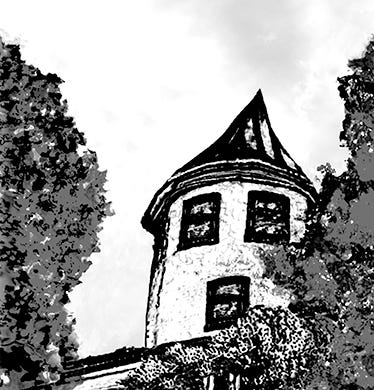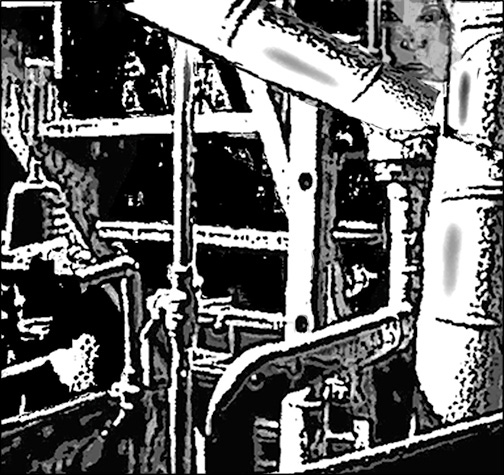Greetings!
I write about the delights, dilemmas and dangers in the lives of activists, that wildly diverse cohort of folks around the world who organize with others to fight for justice, peace and planetary survival.
I’m especially interested in the representation of activists in novels, movies and other forms of fiction. I’m always on the lookout for full, fair, non-stereotyped depictions of folks like us–union organizers, community organizers, environmentalists, and so on, doing our things and living our lives.
In my own fiction, I strive to create activist characters who are fully human, in stories that are fun, light yet serious, about regular people, with all their quirks and quandaries, whose lives focus on working for a just world in all our various ways.
Written and illustrated by me, with my daughter, Sophie, Rainwood House Sings is the story of Marlie, awakened one November night by a low-flying helicopter, and of Demetrius, chased by that same helicopter, accused of shooting a policeman. Under the sharp-eyed gaze of Marlie’s young granddaughter Samantha, their stories collide in Rainwood House, a decaying but highly historic dwelling, mildly haunted by past racial justice struggles… and musical plumbing.
And now, Rainwood House Sings…
Chapter 1.1 The Basement
A child’s voice jolts Demetrius awake. “She sang and she sang and she waited ‘til her belly broiled!” it shrills, directly overhead. Feet clomp on the floor above him. Pieces of grit shower his upturned face. “We’ll go a-waltzing Matilda for free!”
It’s ‘his billy boiled,’ Demetrius fumes silently, screwing his eyes shut. And ‘with me,’ not ‘for free.’
On an intake of musty air, pain shoots through his ribs. His body aches, stings, throbs.
“Blame the jolly humpback…!” screeches the voice above his head.
Demetrius squeezes his eyes tighter. He pictures the University of Maryland campus lawn where he had lounged with his cousin Jane after finals–his in Horticulture, hers in Education–in the long-ago spring sunshine, hearing somebody’s nearby boombox warbling the Australian folk tune.
“Hey cuz,” he’d said, on a lazy stretch, “you know that song ‘Waltzing Matilda’ was written during a nineteenth-century Australian sheep-shearers’ strike?” Jane had looked up from reading Wretched of the Earth. “Tree, when they invent activists’ Trivial Pursuit, you’ll ace it.”
Eyes still closed, Demetrius smiles, his muscles relaxing as if into that soft grass. His hand flops onto a cold, hard surface and he snatches it back. With a sigh, he hoists himself into a sitting position and cautiously opens his eyes.
At first, he sees only thick darkness. Then his gaze is drawn toward a gray smear of light. It sharpens into a small dirty window set in a door at the far end of a long wall of damp-looking stone.
His mind floods with memories: the helicopter roaring overhead, his dash toward the big house looming out of the shadows. His stumble on a tussock of grass that pitched him down a stairwell, one flailing palm bashing into a doorknob. His rush of amazement as the knob turned in his hand, the door burst open, and his body shot inside.
He remembers hurtling through blackness, crashing into piles of boxes, landing in a heap on a cold cement floor, his head spinning not with stars but red and blue police lights, searing white flashlights, watery orange street lamps.
Crouched in the dark, Demetrius had felt his bones vibrate as the helicopter circled above the house, growling like a frustrated tiger. Eventually, its noise faded until he heard nothing but his thudding heart.
When he’d mastered his breathing and the urge to throw up, his mind ordered him to get out before anyone came down to investigate. But a deeper node of self-preservation held him motionless.
After an eternity, he’d crawled over to inch the door shut. Then, he groped through blackness and invisible junk until his hands found a hard horizontal surface a few feet long, a few inches off the floor, covered in what felt like thick paper. He had dragged his aching body onto it and slumped in exhaustion, his mind going dark.
Now it’s daytime. Although the murky half-light gives no clue of the hour, his stomach insists he’s missed at least two meals. His eyes make out a few meager, deeply set windows along walls of ancient moldy stone that fade into darkness.
A creepy place, for sure, thinks Demetrius, but maybe better here than scurrying through the streets like a frightened rabbit.
He shifts his weight on the hard slab seat and cringes as the paper crackles.
“Count your blessings, honeybunch,” advises Granny Gus’s soothing voice in his head.
Demetrius nods in agreement. No one has discovered him, no alarm has sounded, no dog has barked. At least, not yet.
A stairway rises to his right behind a tangle of pipes. The chill air seems full of low rumbles, like sound effects for a submarine in an old movie.
Demetrius spots his duffel bag near some overturned boxes. Somehow he’d kept hold of it during his plunge through the door, losing his grip in the crash landing. With a suppressed grunt, he hauls himself to his feet, picks his way over and gingerly disentangles and lifts the bag. He retraces his steps in slow motion, clutching it with both hands in front of his body to avoid bumping anything. He takes special care while passing a large strangely shaped object draped in a dingy cloth, which releases a cloud of dust as he brushes by.
Gritting his teeth, he lowers himself to his hard seat and places his bag beside him. He rolls his neck and shoulders and lightly touches the bump on his head where the police stick jabbed him while he hid in the garbage heap. He opens and closes the hand that banged against the doorknob. Every molecule in his body is sore, but nothing seems broken.
Not bad for an out-of-shape 34-year-old, Demetrius thinks, raising his arms in a cautious stretch. His preferred pace is ambling—around his DC neighborhood, along the little Eastern Shore beach in front of his Granny Gus’s house, through the green spaces of the National Arboretum where he works. He would never have thought himself capable of escaping police pursuit. Yet he has—so far.
Thumping feet sound again on the floor above, releasing more dust into the air. The morass of pipes begins vibrating like a pressure cooker, then bursts into a chorus of wailing. Demetrius stiffens in alarm, picturing being hit by an explosion of metal fragments and torrents of water.
But nothing happens. After a moment, the tumult subsides.
Demetrius lets out his breath. His eyes follow the pipes as they twist like jungle vines among the mildewed columns, crisscrossing below the gnarled wooden beams that shoulder the low ceiling. Cavernous space stretches away into murk filled with vague shapes. His mind grows hazy, as if melting into the thick air. The sensation carries him away.
Thanks for reading! Come back next week!
Notes:
Serial Stuff. My intention to include recorded versions with my serialized posts is proving somewhat elusive, due to my elderly equipment. I will begin doing so in the not-too-distant future.
Because of post size limitations, Rainwood House Sings chapters are divided into smaller episodes in the serialized version, with a brief catch-up note at the beginning.
Disclaimer Manifesto. This is to counteract my FWWB (Fiddling while the World Burns) anxiety that my work is less relevant or useful than that of activist colleagues and comrades around the world who are wrestling with monumental issues and directly challenging the range of injustices, oppressions, and outrages.
Lifting up activists and social movements in fiction, and reflecting on activist culture in real life feel like much too slow means of changing the world in the face of the climate catastrophe and nuclear annihilation. While I believe it’s vital to look inward and better understand how activists think, feel, experience our situation, and interact with one another, I regularly am assailed by the feeling I should instead be organizing out in the streets all the time.
Feeling one is not doing enough, in particular when engaged in creative pursuits rather than directly confronting the system, seems to be an integral feature of the activist emotional landscape, so at least I am not alone. Among the ways it is acknowledged is this song by the late great Cuban singer-songwriter Pablo Milanés, Si el Poeta Eres Tú. Not that I feel I would rather be a guerrilla fighter than a writer, but, mutatis mutandis, the general sentiment applies. And it is a lovely song.
Leave a comment! Suggest a book or movie!







Wonderful writing and story. Can't wait to read more!
<3